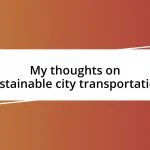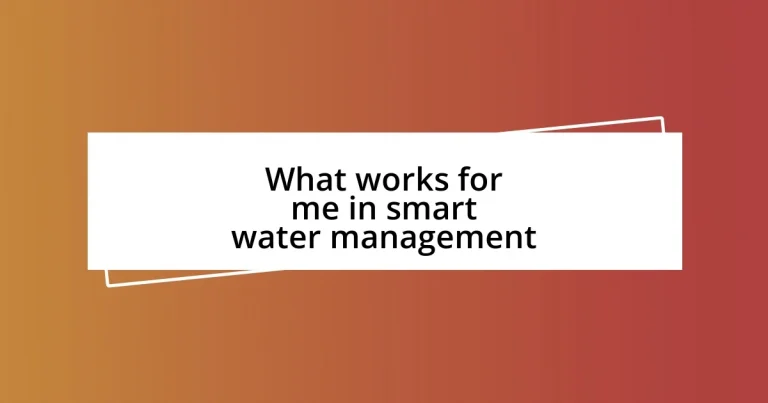Key takeaways:
- Smart water management integrates technology, like smart meters and IoT solutions, to enhance water efficiency at home and in urban planning.
- Efficient water use through simple household changes, such as low-flow fixtures and rainwater harvesting, significantly contributes to conservation and economic savings.
- Future trends in water management include AI-powered analytics for demand prediction, decentralized systems for community control, and educational tools to foster water conservation awareness in younger generations.
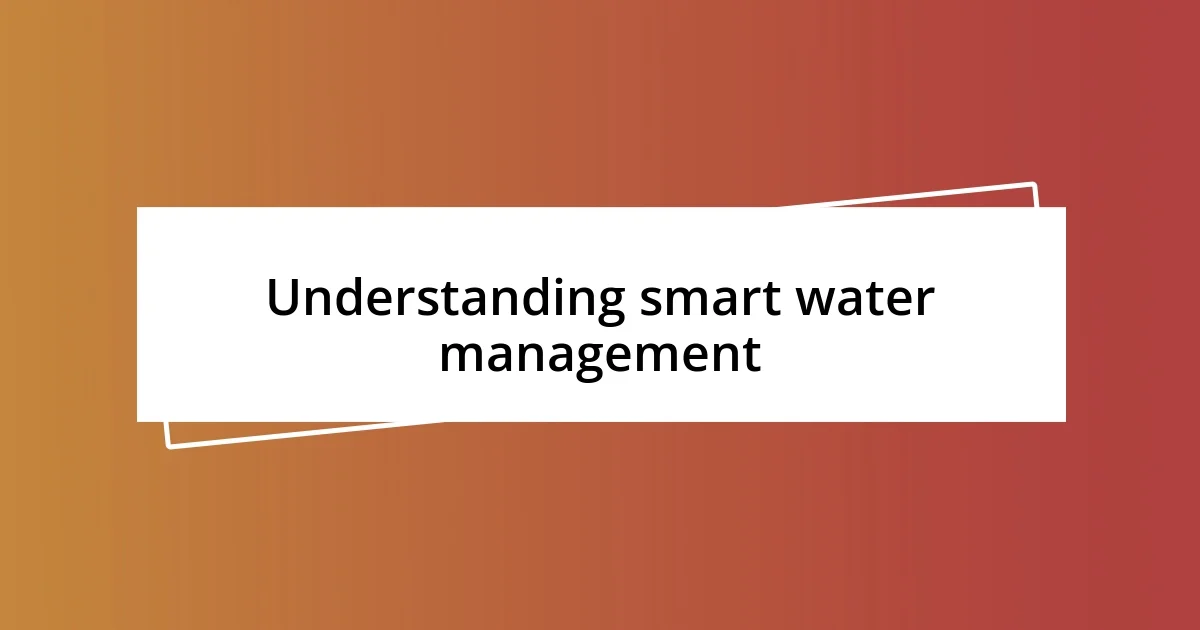
Understanding smart water management
Smart water management is all about using technology to improve the efficiency of water use, ensuring that we use only what we need while protecting this precious resource. I remember attending a seminar where a speaker spoke passionately about smart meters. It struck me that these devices not only help reduce waste but also allow homeowners to monitor their water usage in real time, much like tracking steps on a fitness app. Have you ever thought about how much water might be slipping away unnoticed in your home?
In my experience, integrating IoT (Internet of Things) technology can revolutionize how we approach water management. For example, smart irrigation systems adjust watering schedules based on weather conditions. This was a game-changer for my garden; I no longer experienced the guilt of over-watering or the stress of plants wilting due to drought. How reassuring it is when technology steps in to help us make more informed decisions!
Additionally, smart water management isn’t just for our homes; it’s critical in urban planning. When city planners incorporate advanced solutions like leak detection sensors and data analytics, the benefits multiply. I’ve seen cities transform their water supply strategies, reducing both costs and environmental impact. How inspiring is it to think that innovative approaches can lead to a sustainable future for all?
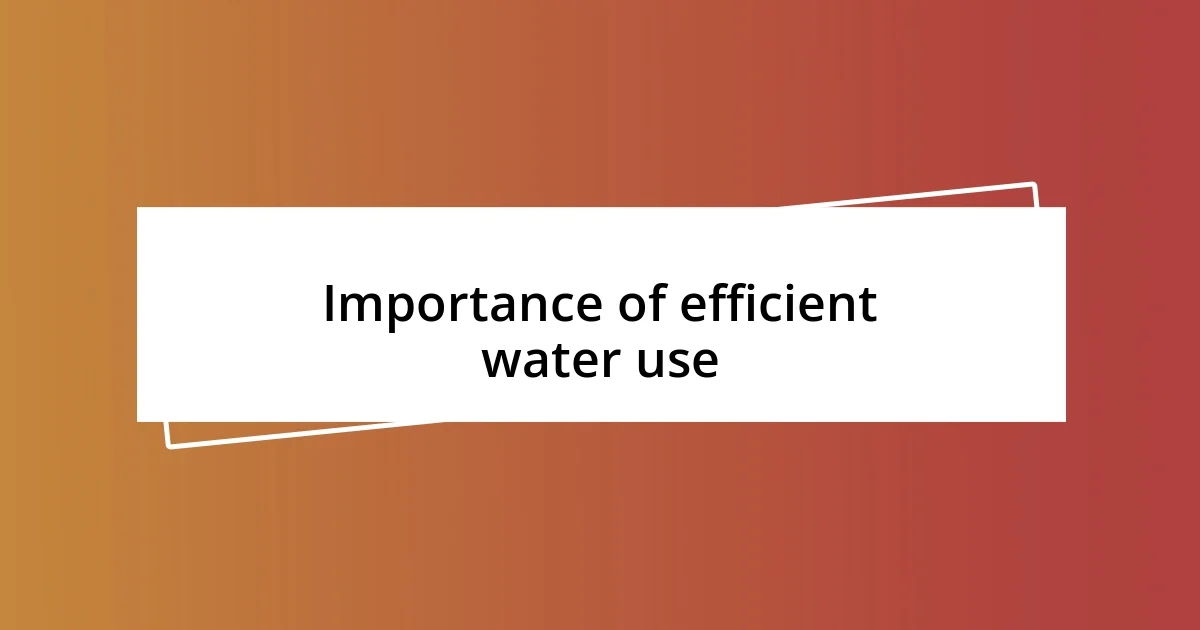
Importance of efficient water use
Efficient water use is crucial not only for conservation but also for economic health. I once volunteered at a community event focused on water sustainability, and it was eye-opening to hear how much water could be saved through simple household changes. For instance, switching to low-flow fixtures can drastically cut down overall water consumption. It made me realize that even the smallest adjustments in our daily routines could collectively make a significant difference.
I recall a neighbor who had a rainwater harvesting system installed. Watching them collect rainwater for their garden was truly inspiring. It illustrated how reusing natural resources not only helps the environment but also cuts down on water bills. Every time I saw those barrels filled after a good rain, I was reminded of the tangible benefits of efficient water management. It’s not just about saving money; it’s about fostering a mindset that respects our precious resources.
What struck me during my research is the profound impact of water efficiency on communities. I learned that in regions facing droughts, investing in water conservation can enhance resilience against water shortages. During my travels, I witnessed this firsthand in a small town that embraced xeriscaping—designing landscapes to reduce irrigation needs. The result wasn’t just beautiful gardens, but also a strong sense of community pride in safeguarding their water supply. Isn’t it empowering to see how individual actions can lead to collective benefits?
| Aspect | Importance of Efficient Water Use |
|---|---|
| Resource Conservation | Preserves limited water sources for future generations |
| Economic Benefits | Reduces costs for households and municipalities |
| Environmental Health | Minimizes strain on ecosystems and supports biodiversity |
| Community Resilience | Enhances preparedness in water-scarce regions |
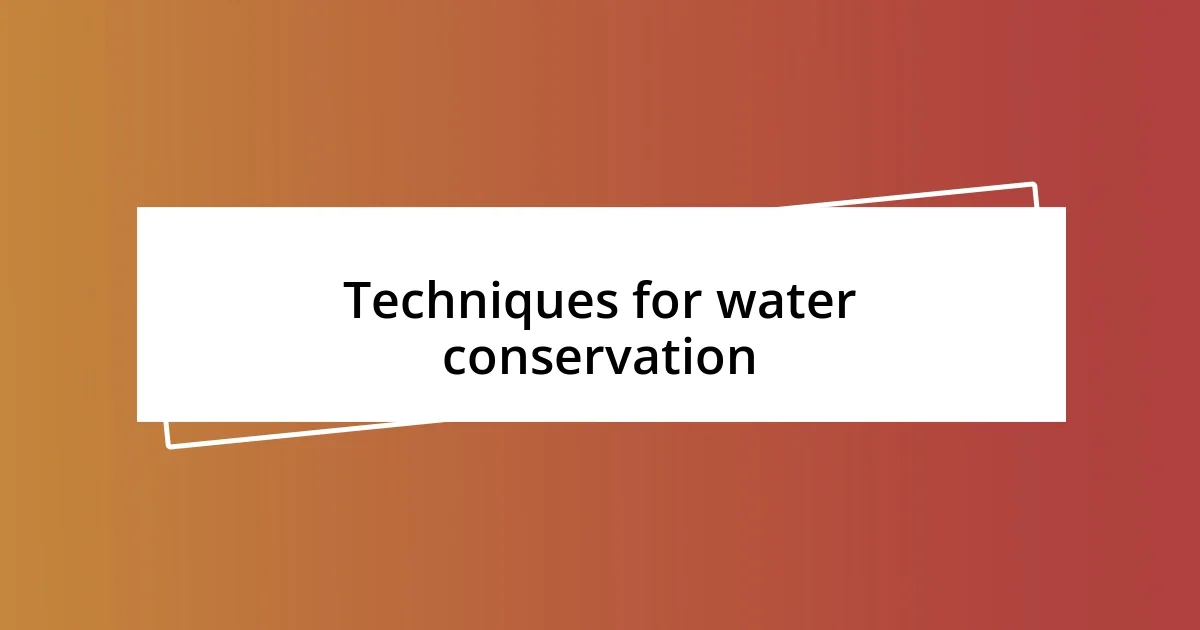
Techniques for water conservation
I’ve learned that practical techniques for water conservation can make a real difference in everyday life. For instance, I started using a simple kitchen trick: collecting water while waiting for it to heat up. Instead of letting that water go to waste, I use it to water my plants or even fill up the dog’s bowl. It’s surprisingly satisfying to see how something so minor can contribute to a larger effort in conservation.
Here are some effective techniques that have worked for me:
- Shorter Showers: I’ve set a timer for my showers. It challenges me to be mindful and save water.
- Mulching: Adding mulch around my garden not only preserves moisture but also reduces the need for watering.
- Toilet Upgrades: Installing dual-flush toilets was an investment, but it drastically cut down my water bill, and I feel more responsible about my usage.
- Native Plants: I’ve replaced my lawn with native plants that require less water. Not only do they thrive, but they also attract local wildlife.
- Drip Irrigation: This method in my garden targets the roots directly, reducing evaporation and wastage.
Embracing these techniques has reshaped how I view water in my daily life. With each small change, I’ve felt a deeper connection to the environment and gratitude for the resources we often take for granted. It’s like I’m part of a larger movement, taking tangible steps toward a sustainable future.
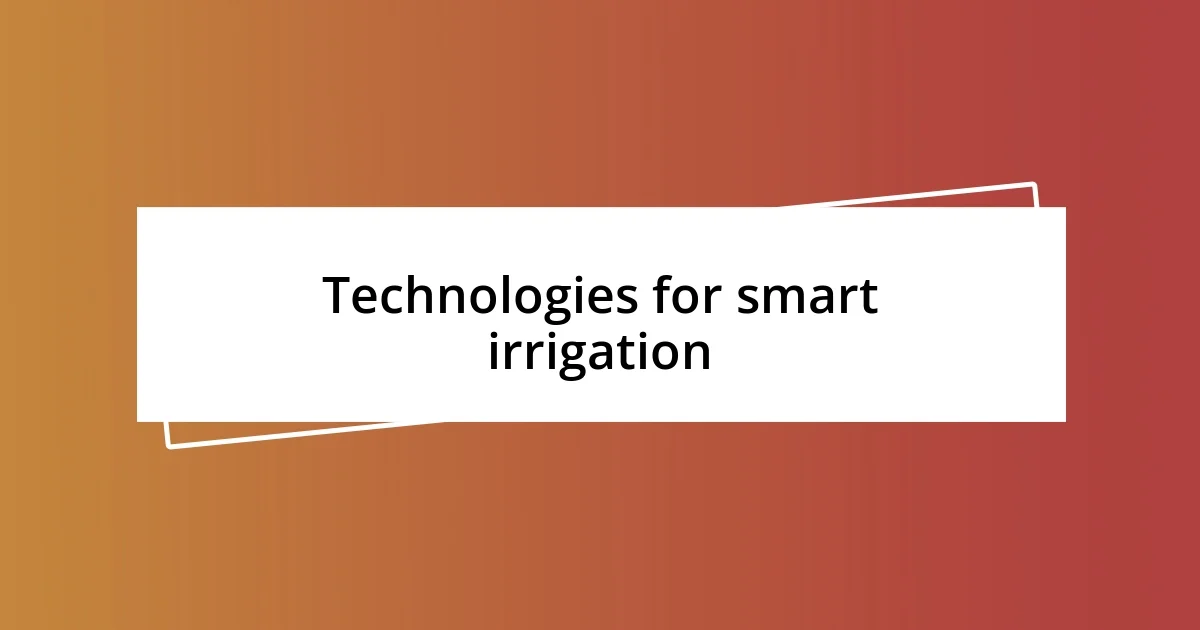
Technologies for smart irrigation
I’ve found that smart irrigation technologies can transform how we manage water in our gardens and landscapes. For example, I once visited a friend’s home equipped with a soil moisture sensor. It was remarkable to see how this little device monitored the moisture levels and automatically adjusted the watering schedule based on real-time data. This not only kept her garden thriving but also slashed her water bills significantly. Have you ever thought about how technology could make your gardening easier and more efficient?
Another fascinating technology I encountered was weather-based irrigation controllers. When I first learned about them, I was skeptical. However, after seeing one in action, I was sold. These controllers take local weather forecasts into account, ensuring that watering happens only when necessary. It really struck me how much smarter our approaches could be—like having a personal gardening assistant who knows just when to keep the plants hydrated!
I also experimented with drip irrigation in my vegetable garden, and the results were incredible. Not only did it provide precise watering directly to the plant roots, but it also minimized water loss through evaporation. Watching my tomatoes flourish while using so little water felt amazing. It’s a reminder that when we harness the right technologies, we’re not just conserving water; we’re taking confident steps toward a sustainable future. Have you considered how integrating these technologies could enhance your own gardening experience?
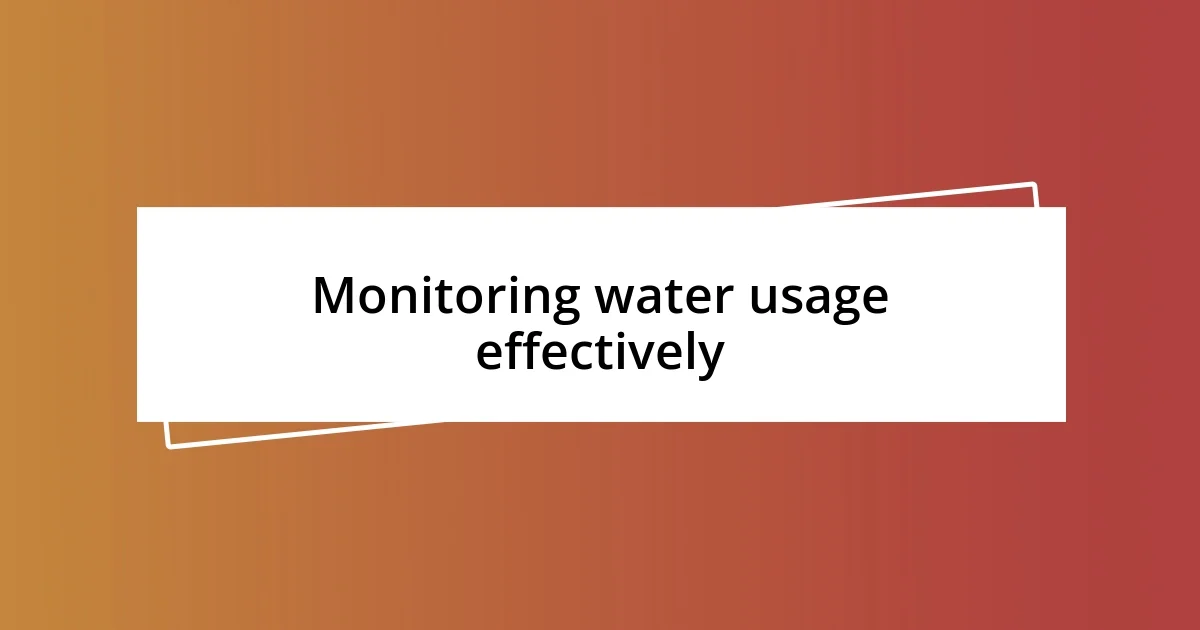
Monitoring water usage effectively
Monitoring water usage is more crucial than ever. I can’t stress enough how much I’ve learned from tracking my water habits. I started keeping a journal to jot down my daily water usage, and honestly, it opened my eyes to just how much I was consuming. At first, I was shocked to see how those extra long showers added up! Have you ever taken a moment to reflect on the little things that could make a big difference?
To get more precise about my usage, I decided to install a water meter app. It was a game-changer. I’ve come to realize how beneficial it is to monitor my water use in real-time, allowing me to identify spikes and target areas for improvement. The satisfaction of seeing my average daily usage drop consistently was exhilarating. I wonder if you’d find that motivating too!
I also ventured into the world of smart home devices. I recently set up smart water sensors that alert me if there are unexpected leaks. This not only prevents loss but also gives me peace of mind. The thought of waking up to a water bill that’s mysteriously higher can be quite anxiety-inducing, don’t you think? It’s moments like these that make monitoring our water usage not just a responsibility, but an empowering choice I’ve made for my home and the environment.
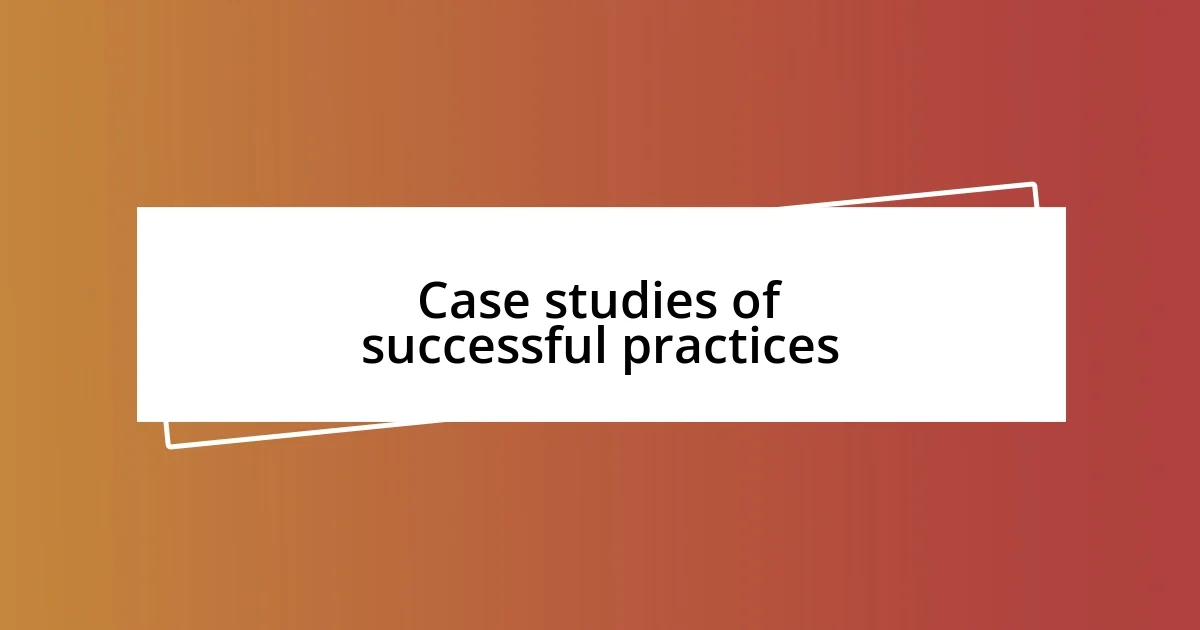
Case studies of successful practices
When I first dug deeper into case studies of successful water management practices, I was particularly inspired by an initiative in a nearby community. They implemented a rainwater harvesting system that collected runoff from rooftops and redirected it to underground tanks. The residents shared how their gardens thrived during the dry season, and it was heartwarming to see a community come together to embrace sustainability. Could you imagine your neighborhood rallying to make such a positive environmental impact?
Another striking example involved a local school that installed a greywater recycling system. They redirected water from sinks and showers to irrigate their school garden. I remember attending a school event and seeing the vibrant plants flourishing just a few feet away from where the students were washing their hands. It made me appreciate the simple yet effective approach of reusing water in such a lively space. Have you ever thought about how schools could take the lead in teaching sustainability through action?
A fascinating case study that really resonated with me was a farm that used precision agriculture techniques. They employed drones equipped with sensors to monitor crop health and soil moisture levels. When I learned about how they could apply water only where needed, I was amazed. It’s refreshing to think that technology can help farmers be so efficient while conserving vital resources. Have you considered how adopting similar practices could transform not just agriculture but our own gardening efforts?
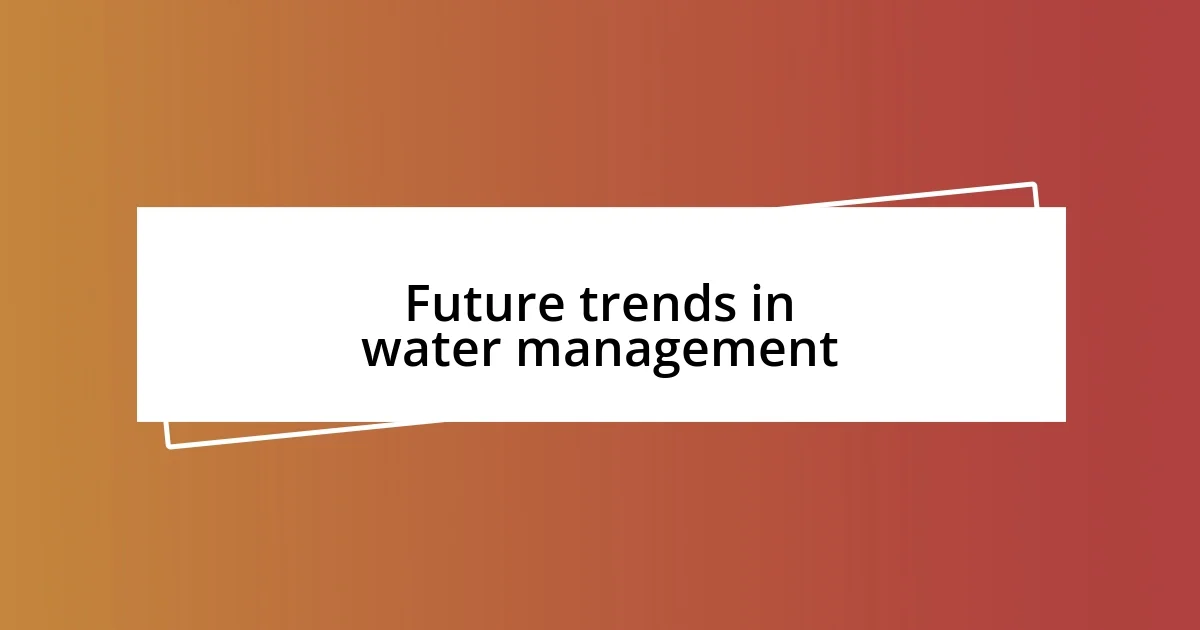
Future trends in water management
The future of water management is increasingly leaning towards smart technology integration. Personally, I find it thrilling to think about advancements like AI-powered analytics that can predict water demand based on usage patterns. Isn’t it fascinating to imagine a world where algorithms can help us conserve water before we even realize we need to change our habits?
Moreover, I’ve noticed a growing trend in decentralized water systems, which encourage localized solutions. For instance, I’ve read about communities employing small-scale water treatment facilities that can handle their own wastewater. Wouldn’t it be empowering for neighborhoods to manage their own water resources instead of relying solely on larger municipal systems? It makes me think back to those simpler, community-driven days when people took pride in local stewardship.
Looking ahead, I truly believe that education will play a pivotal role in water management. The emergence of interactive apps meant for schools can teach kids about water conservation through gamified learning. I can only imagine how engaging it would be for children to compete in challenges around saving water. Isn’t it heartening to think about how our future generations might grow up as environmentally conscious citizens, equipped with the knowledge to proactively address water issues?






